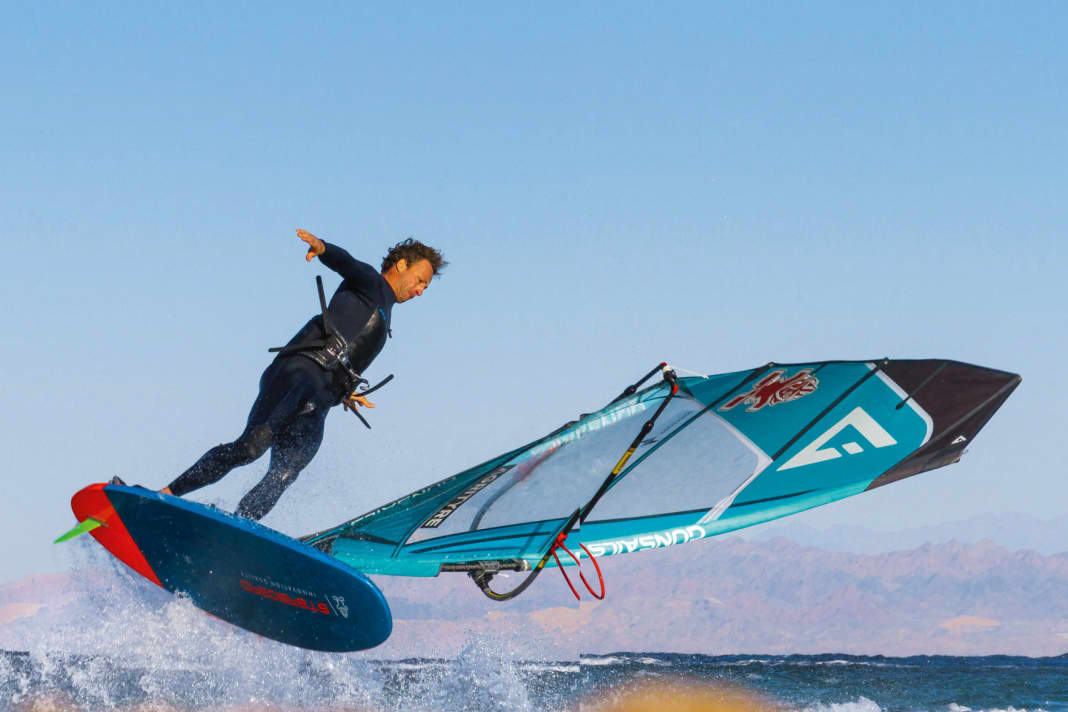Instead of calling it a day, he is setting himself new goals for the coming season. At boot Düsseldorf, he announced that he would continue to compete on the freestyle tour. Reason enough to look back on the varied conversations of that evening, when I tried to find out a little more about Steven and his extraordinary career.
We are sitting on the promenade in Westerland, on the comfortable sofas at the surf magazine stand. In front of us, the setting sun on the rough North Sea horizon and a good 20 knots from the north-west - flat onshore as (almost) always. Outside, the supersession is on: "What a backloop by Marcilio Browne!" booms through the speakers in front of the tent as Steven walks past us. He has a snack in his hand and is obviously looking for a place to sit back and eat - after all, the Belgian has ten days of Sylt World Cup behind him.
He is visibly excited when I wave him over to us in the cosy tent. Today, on the penultimate day of the World Cup, the 37-year-old has come third in freestyle. I congratulate him and offer him a beer, even though I know that he is actually extremely health-conscious: at home with his family, he eats an almost entirely vegan diet, is in top shape and is actually always in training. As far as I know, he is now even training on the iQFoil at the same time - with the aim of competing in the Olympics.
37 - an old age in freestyle
But I think there's a good chance he'll say yes today. After all, the World Cup is over tomorrow and he has once again finished on the podium - more than ten years after his world championship title. And I also know that Steven likes to celebrate from time to time. He says yes, we'll have a toast.
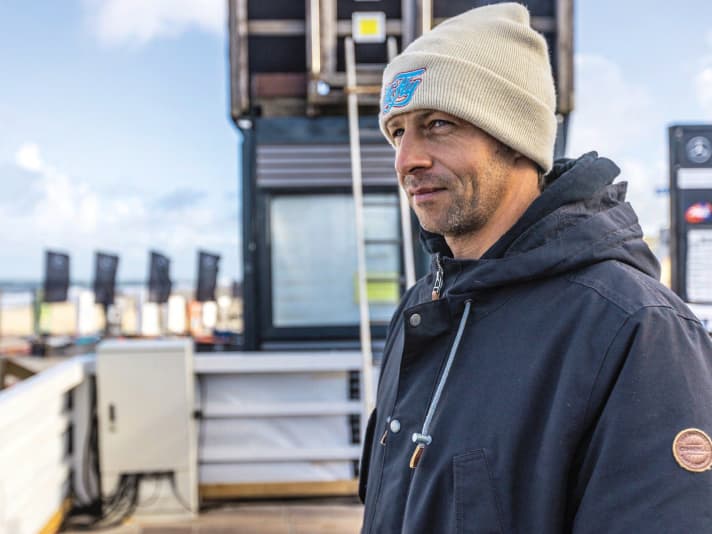
Thirty-seven ... I think about it, that's an old age for a freestyler. A family man with a house and a farm. He was already world champion in the discipline over ten years ago - and he's still here, even though the tour and the discipline haven't exactly become more lucrative in recent years: "It's just too much fun, I love windsurfing, especially freestyle, and somehow also the competition, that's why I'm still here. It's as simple as that. I enjoy it too much to just stop and call it a day," explains Steven, taking a sip of his beer and gazing out over the rough North Sea for a long time.
I enjoy it too much to just stop doing it"
16 surfing days a year and third in the world championship rankings
He has already competed in several freestyle competitions out there and took his world championship title here in 2011: "Here, in these unpredictable North Sea conditions, I can score points with my many years of experience. Believe it or not, I've only surfed 16 days this year. I've had virtually no time to train, neither freestyle nor IQ foil. I've just been working and now I'm back on the freestyle podium - it's almost uncomfortable for me in front of the others who train all year round."
I don't think he has to be uncomfortable about it. But it's quite extraordinary: "The Belgian IQ association no longer sponsors me," Steven continues, "so I no longer have any financial support and can't make a living from windsurfing. It's not like it used to be. I currently work in the warehouse of a logistics company and I repair boards in my garage on the side," Steven reports bluntly, but by no means sadly. He has this pragmatic way about him: he is a real doer, but in a nice, relaxed way.
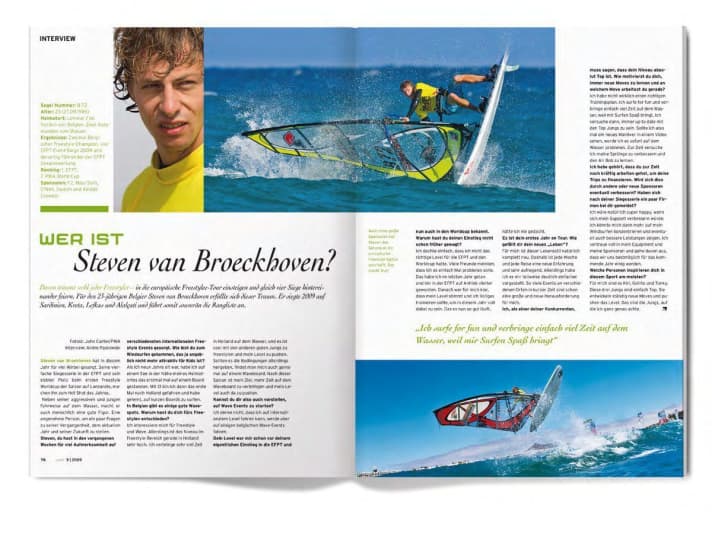
Talk less, do more
I remember back then when the foil style came up and I was tweaking my foil box with Steven in his garage (which was more like a perfectly organised and equipped board forge). I wasn't sure whether I should really try jumping on the foil as I didn't think it looked very elegant and somehow uncool. Of course, Steven was able to do the burner and switch kono on the foil after just three days. He was really euphoric and enthusiastic about putting his home-made foil box on my board. He didn't respond to my subliminal comments that the jumped tricks wouldn't look as good with this bulky, unsightly scythe under the board, but then said dryly at some point: "It doesn't always have to look good. You'll see that it's great fun and fulfils its purpose so that we can jump our moves even in gusty twelve-knot winds on the quarry pond. And now let me get on with the sawing, I have to concentrate. It should be finished by tonight, it still has to dry. You want to get out on the water at the weekend, don't you?"
And that's exactly what Steven is. He doesn't argue for long. He takes things into his own hands to make progress. He doesn't really care what others think, how something looks in detail or how it comes across to others. He does what needs to be done.
Van Broeckhoven knows his body and his material down to the last detail
This means that he generally has a different approach to the discipline of freestyle than most others. I mean, iQFoil and freestyle? Two disciplines could hardly be more different. Steven simply combines them both. In a freestyle run, for example, he knows exactly when, what and where to do in order to collect the points he needs to win. On land, in terms of appearance and character, most people would probably not call him "Mr Freestyle" straight away. But he is one of the most talented acrobats with a board and sail - and compared to most other talents in freestyle, he is also very disciplined and knows his body and his equipment down to the smallest detail.
His style may not be quite as casual, relaxed and reckless as that of the young savages, but it is very powerful, goal-orientated and highly technical. He is by no means ridiculed for his style and his pragmatic approach by the unorthodox, wild freestylers, but quite the opposite: highly respected, even admired. At the same time, he is down-to-earth, friendly and always happy to help anyone. Every now and then this certain coolness comes through in him and you realise that he doesn't really care what others do or think.
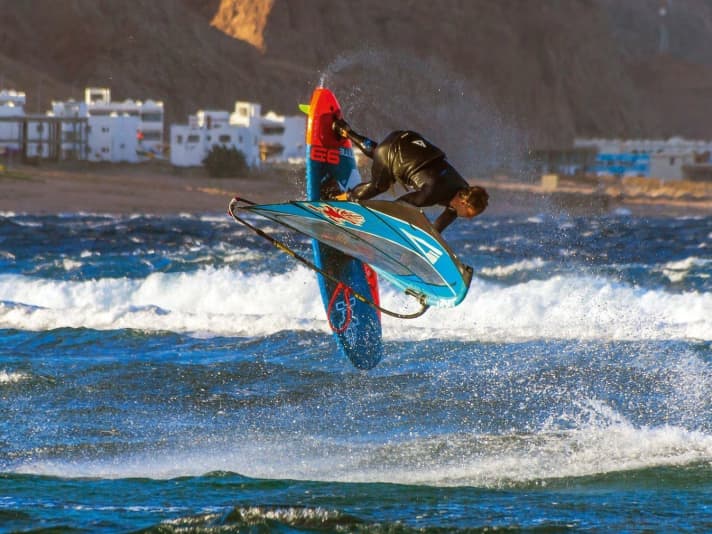
"I no longer put myself under pressure"
Many other freestylers on the tour are young, deeply relaxed types for whom life is not a mystery, but most of them are not really professional. They live and surf for themselves and don't have much responsibility. Some keep their heads above water with small amounts of sponsorship money, others just get by. But many don't even want more, as they are on the sunny side of life and often even smile at self-promotion for silly, external sponsorship deals: "They do hotel mum in between, then pack the board bag and off they go again. That's how it works for almost everyone," says Steven and takes a big bite of his vegetarian kebab.
You could really work sensibly with him" (Martin Brandner about Steven van Broeckhoven)
And he doesn't mean that in a derogatory way: "It was the same for me for a long time," he continues, "it was only when I signed the contract with JP and NeilPryde in 2011 after my world championship title that I saw it as a real job and was able to put something aside and start building something for myself." Martin Brandner, the brand manager of JP-Australia at the time, once said that of all the team riders he had ever worked with, Steven was one of his favourites: "He was really easy to work with," he explained in an interview.
"Many people always claim that my sponsors at the time put too much pressure on me - and that's why I didn't become world champion again. That's not quite true: I put myself under pressure after winning the title," Steven reports gloomily, "but those days are over now, I don't put myself under pressure anymore and that's why I'm suddenly doing better again. I'm very happy with the relationship I have with my current sponsors GunSails and Starboard and will be going on the attack with them again next season. But without pressure, just for fun!"
Worker mentality meets talent
Despite his long professional career and superstar status after winning the world title, Steven has this working-class mentality deep down. And that, combined with his talent with a board and sail, has taken him a long way: "We're just normal people from the Belgian hinterland. I trained as a plumber after school and started working straight away." He grew up far away from the coast and never had the opportunity to train regularly as a teenager: "I spent hundreds of hours doing light wind tricks on the local quarry pond, because there's very little planing wind there. Nevertheless, for some reason I only ever had windsurfing on my mind, admiring the posters of Josh Stone on the wall at the surf club. At some point, friends from the lake regularly took me to the Brouwersdam in Holland at the weekend. There I was finally able to start practising my tricks in stronger winds," says Steven.
Although his parents always gave him the best possible support, they were not windsurfers themselves: "They always let me do what I wanted and never pushed me in any particular direction. For me, that's the most valuable support you can get as a child and teenager. I'm now trying to do the same with our young son," Steven affirms and takes a final sip from his can. Then he zips up his jacket and stands up: "I have to get my equipment from the beach, it's about to get dark." And bang, he's gone. That's what I mean, Steven doesn't faff around for long. But now he turns round on his way out: "Thanks for the beer, see you in town later?"
He's talking about the bistro where the World Cup scene meets in the evening. Tonight is the last evening. There could be a lot going on, I reckon.
His family is immensely important to Van Broeckhoven
A few hours later, I meet Steven again in the middle of Sylt's nightlife. He's standing in the far corner, looking a little tired and bored. "I don't like the music somehow, I can't really get into it," he shouts in my ear, "just like my son the other day, at ballet," he continues with a laugh, "he wanted to dance and then my wife just blindly signed him up somewhere. After the first lesson, it turned out to be a ballet class." Now we are standing in the far corner of the bistro, laughing out loud, while people dance wildly in front of us. Steven only ever seems to have his family on his mind. He may be alone here on Sylt at the moment - but he always has his wife and child with him when it suits. He simply enjoys coming to the events - and if he has to, he sometimes does it alone. On top of that, he always earns a bit of prize money thanks to his good results.
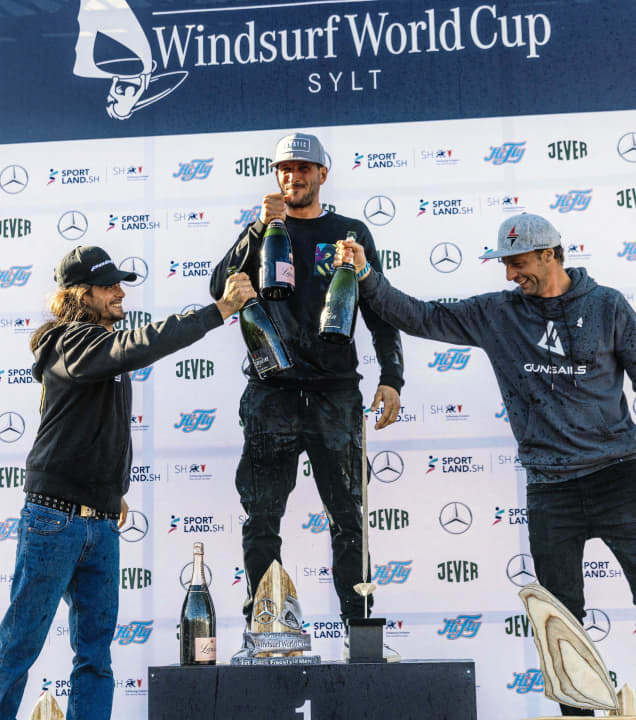
Even if it doesn't look like it right now, he has a lot of responsibility compared to most of the others who are dancing wildly around us. Making sure his family is doing well is always his top priority. Windsurfing is his next priority, so that he can continue to get out on the water and have fun. And for him, that doesn't mean celebrating his manoeuvres alone, at the end of the world, in the sunset - but continuing to compete with others at ten degrees in the Sylt shorebreak. That's why he's here.
Van Broeckhoven's story is simple, but extraordinary
We are now standing in the quieter side room of the bistro, the gentleman still doesn't like the music next door. He can't remember exactly how and when it all started for him back then, with the competitions and the good results: "Phew, that was so long ago. But I remember at my very first competition, the European Cup in Tarifa in 2008, I came fourth straight away."
I set out to become a professional. I thought to myself: if I'm going to do it now, it's worth a try."
Fourth at the first attempt, I mused, that's what other years work on to get into the top five: "I came back from holiday, went to my boss and gave notice. I was already in my early 20s, had been working for a few years, saved up some money and bought a small van. I set out to become a professional. I thought to myself: if I'm going to do it, do it now - it's worth a try."
And that was definitely it: the following year, 2009, Steven won the first of five European Championship titles and also came fifth in the World Cup rankings. His story is simple, but extraordinary. It can hardly be compared to that of most other freestyle super talents who grew up on the beaches of the top spots and were flown to events in Europe as teenagers. As you can see, anyone can make it.
At this moment, Steven is listening to a song he likes, while his fellow countryman and 2019 freestyle world champion Yentel Caers walks into the bistro - Steven storms off and we get lost in the crowd.
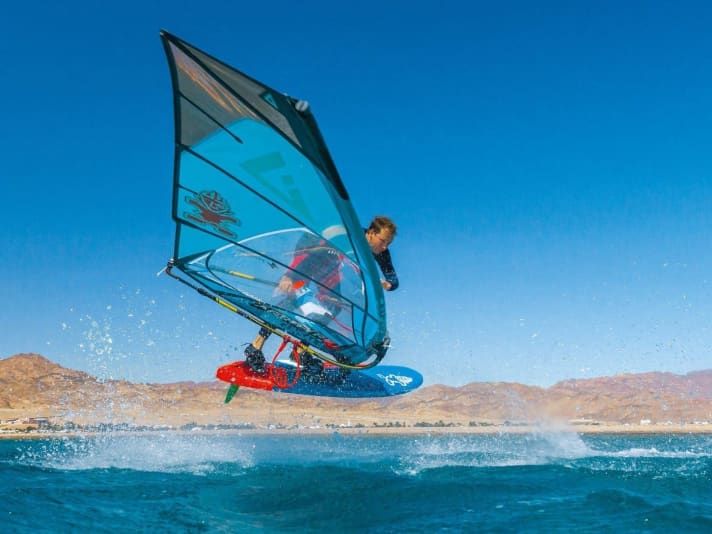
Late-night dinner at McDonald's
At the end of the evening, I meet him again at McDonald's - the only place in Westerland where you can still get something between your teeth late at night. He stands in front of the display board like a small child and waits until his order number lights up green: "Biieeeep, number 218!" He looks at his receipt and gets all nervous because it says 219. Now I buy that he hasn't been to McDonald's for at least ten years.
If only the tiniest event in my career were to be cancelled out, I wouldn't still be here.
As we bite into our Vegan TS, I talk to him about tomorrow's award ceremony and congratulate him once again on his third place, the usually pragmatic Steven almost gets a little emotional. He thanks me and then speaks thoughtfully out of nowhere: "If you were to take away even the smallest event in my career, I wouldn't be here now. I wouldn't be eating a vegan burger at McDonald's for the first time and I wouldn't be standing on the World Cup podium again tomorrow with a trophy in my hand - everything has actually worked out perfectly so far." Wow, I never knew him to be so profound.
His early films are cult among young freestylers
Afterwards, we chat a little about God and the world, about his earlier film projects with Michael Sumereder and Andraz Zan, of whom many freestylers of my generation are still big fans. Steven, who is usually so efficient, has time to chat this evening. Because we've brought so much of the past back to life tonight that he can now really put himself in the situations again and talk about them in a relaxed, light tone.
On our way out, the waitress has to unlock the door from the inside - even McDonald's is closing its doors now. We step outside, into the open air. The cold North Sea wind whips into our faces. The rain sprays under the cones of light from the lanterns: "Well then, good night!" Steven pulls his black hood over his head and disappears into the dark alleyways of Westerland.
